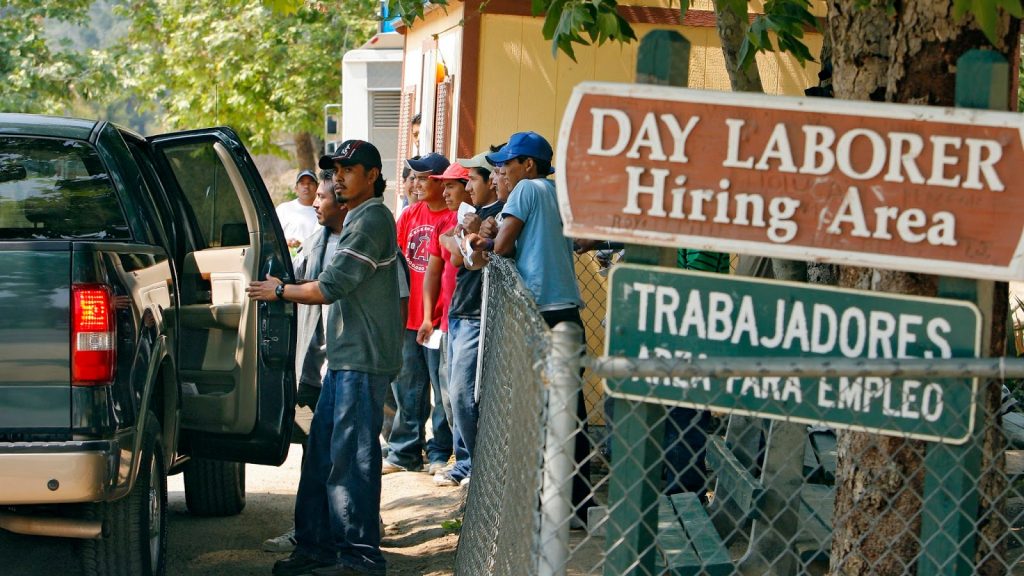
Mass Readings for the 25th Sunday in Ordinary Time:
Isaiah 55.6-9 Psalm 145 Philippians 1.20-24, 27 Matthew 20.1-16
The parable of the laborers is a familiar one that Jesus tells to explain a simple fact about the kingdom: it is the same reward for all who come to God, whenever they come. If you are by grace fortunate enough to come to Him early in life, rejoice in that; if you come late, be consoled—salvation, redemption, eternal life; there are no lesser and greater forms of these things—it’s the same for everyone, you, me, St. Augustine, St. Francis, St. Catherine of Siena.
I think we all get that.
So, I’d like today for us to think about where the landowner of the parable finds his laborers: the marketplace where men gather and stand idle until they are given an offer of work. It’s this image that intrigues me because it speaks to the moment the Church finds herself in right now, but it’s a situation she’s been in before. It’s been a while since we enjoyed a near monopoly on the attention of people and on the means of intellectual and spiritual formation of children, men and women (really, not since the late middle ages/Christendom).
We better believe there is a marketplace—a marketplace of ideas, of social movements, of popular causes; and the whole of humanity is there, and they are being recruited, hired on to all different kinds of work—and they are gladly hired, even if it is questionable work!
It’s a commonplace psychological observation that people need to work—it gives them a sense of purpose, it is good for their self esteem that they are productive, contributing to their society in some manner; the same is true of the less tangible, spiritual, but no less real need for people to believe in something. It helps them give meaning to their existence, that they are, again, contributing to something greater. We sometimes refer these days to the “God shaped hole” that we all feel when God is absent in our lives. That space in our souls does not exist as a vacuum, something always fills it—when younger a passion for a sport or for music can fill that void for a time, but it doesn’t take long in one’s development into adulthood to find that this is not enough. And so, to return to Christ’s metaphor of laborers idling in the marketplace, people go there every day seeking to be hired, to give themselves to a project that in return rewards them, not with a day’s wage, but with a sense of meaning and purpose. And it’s not too much to say that they go every day. Someone shared with me a story about a nun, a religious sister, who was celebrating the 50th anniversary of her final vows; and she was asked when did she decide to become a nun. The sister replied, “this morning.” She makes that decision about her vocation, not once sometime in the past, but every day.
The Church is not alone in the marketplace, we’re not the only ones hiring. Some are recruiting for liberalism, others for Islam, still others for secular materialism; others still for a tepid, hollowed out form of Christianity; and we ought to regard with great concern the continuing success of those who recruit for that most odious of ideas, Marxism, that plays upon ignorance and sentimentality, the half-forgotten gospel and our natural and good desire for justice.
Carl Jung said that people don’t have ideas, ideas have people. If I am, for example, a classical liberal, there are others who share the ideas associated with that ideology. That is, I didn’t come up with that system of thought and it’s not mine but something that has entered my consciousness through the culture that surrounds me, taught to me by an authority, a university professor, a guy with a YouTube channel. It has a long, complex history that predates my existence. I’ve encountered some of its concepts, and insofar as they make sense to me, help me make sense of my life, appeal to me as an ideal, something to work for, that idea takes possession of me. It has me, I don’t have it, because it’s something far greater than me, developed by greater minds than my own, over centuries.

So, when we consider our Catholic and Christian faith, where does it come from? Who has developed it over millenia? If I am going to give myself over to this, hire myself to it; I’d better be sure I know who or what is taking possession of me. I also need to know, what exactly is the job?
The Church often does a very poor job of communicating answers to those questions, and insofar as we can sign people on to the job, we struggle to keep them for long. When we bring them back from the market square, metaphorically speaking, on the back of the truck, and drop them off at the hallowed steps of this place, St. Augustine’s, what next?
What do we say? What do we do? What work do we give them?

I know most of you have within you a strong sense of why you are here, what this Christian life is about, that you likely can answer for yourselves as individuals; but too often in the moment, when asked by someone outside the Church, or someone sadly grown distant from the Church, do you struggle to be articulate the “reason for the hope within you.”
There is confusion, sometimes even a reluctance to actually give the answer we know to be the full truth. Instead of being guided by the Spirit, the temptation is to try to appeal to those caught up in the world in worldly terms: “oh, going to Mass, it’s a nice break from the busyness of life, a quiet time with God”; “you meet the nicest people at Church”; “we do a lot of charity work in the community,” etc.
That kind of soft sell has been tried over the course of the last fifty years, and it has failed.
When the Parish Advisory Council went through a recent visioning exercise guided by our vice-chair, Doug Herman, this was very much what they were grappling with: what do we say? What are we doing? What is the job?
Not that there aren’t good things happening here, but are we aware of them? How do we succinctly answer the question, “what do you do here?”
They came up with an answer, which I am sure we will further refine and expand upon, but the simple answer they first came to about what the job is, what our work as individuals and a community is, it is to put Christ above all things. That is our vision, mission, that is our work, to realize that.
So, when we go out into the streets to make an invitation to be a part of this community, when like the landowner we go out into the local marketplace of ideas to hire from among those of Dundas, the unbaptized, the unchurched, the lapsed Catholic, the indifferent Christian and they ask, “what’s the job?” and “what does it pay?”
We here can answer succinctly: the job is to put Christ above all things, in you, in me, in all of us. What that means in specifics, come we’ll show you, we’ll take you through that work, show you the spiritual “factory” that transforms souls and makes them fit for eternity with God; and that’s the pay off, the sweet paycheque at the end of it all is this, to know God, here and now, and to be with Him forever in the company of the saints, you being one of those saints.
And let’s just remember the lessons of recent history: of the Bolshevik Revolution of Russia, Nazi Germany, the Chinese Cultural Revolution under Mao – centuries of cultured civilization are no guarantee against craziness, against absurd and destructive ideas taking possession of people, of men and women signing on to work for the dissolution of society and our young working enthusiastically to obliterate their future.
That’s why we’ve got to go out there, and hire, recruit, bring into this place of divine work people of all age and condition.
It’s a joyful work we’re called to. St. Paul writes that if I am to live in the flesh, that means fruitful labour for me. As we continue in our earthly lives, it means productive work even as we long for the peace of God in its totality, to be in Christ fully and forever, but for now we are to live in a manner worthy of the Gospel, bringing into His Church as many as possible, unconcerned whether we are first or last, just happy we’re there at all.
Amen.